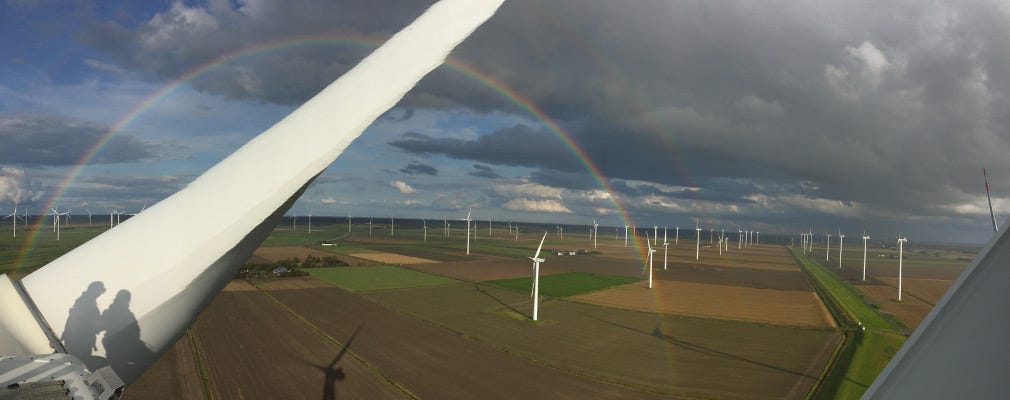Hi everyone, welcome back after a... very long summer hiatus! 😬 The hiatus has dragged on a little through a very busy September and in the absence of my usual early morning writing time. I'm not fully back yet, but here's a quick letter to catch you back up on the topic of my ongoing series on (ethical) entrepreneurship in sustainable energy.
Last time I talked about Charlie Lord's and ACE's attempt to make housing retrofits in disadvantaged communities work in new ways: by developing a business case that could attract traditional sources of finance, while also integrating non-traditional investments in local employment. Let's explore this relationship between sustainable energy and community-centred development a little more.
I'll be taking my cues from this article:
"Harvesting energy: Place and local entrepreneurship in community-based renewable energy transition". Written by Diana Süsser, Martin Döring and Beate M.W. Ratter for Energy Policy in 2017.
The Gist
The main idea they put forward is that community and entrepreneurship can go hand in glove: if innovative spirits take their relationship to their locality seriously, they can help create a community of interest: a collection of people with a stake in the development of new renewable energy development. Together, they can mobilize the identity, networks and resources of that locality to promote or protect the new business opportunity.
The Story
The authors base this perspective on the history of perhaps a somewhat particular locality: a wind-pioneering village on the Baltic coast of Germany. With a sense for the poetic, they write:
Over almost three decades, Reußenköge developed from an average agricultural site harvesting mainly crops into a so called ‘model-region’ for renewable energy generation that harvests winds blowing from the sea.
Residents they spoke to had internalized this pioneering identity and in fact sketched out a whole lineage of innovation:
Interviewees developed a historical bond between the innovative energy of past generations who reclaimed and settled land with themselves, who implement RETs today. "We have been always pioneers/innovators for something new. If you build a dike, you are a pioneer." Or: "People in Reussenköge still have visions". "We are proud here in the North, that we are the pioneers. We have built the first community wind farms here."
Local wind entrepreneurs could thus successfully be seen to keep that spirit alive. But for it to be seen as a community affair, people needed to be involved in the process.

The How
In other words, the initiators needed to take community seriously. That means: communicate, communicate, communicate. Talk (informally and formally) about the importance and benefits of wind, collaborate with them about meeting challenges and working out the details, as well as making sure that profits would also end up in the community.
However, even if you're a communicative wind entrepreneur, please beware that communities discriminate: all the necessary shmoozing (see also: "The messy work of innovation") will pay off more readily if you're 'from the community' and you've already earned your credit. So, best to partner up with a local representative who is well-liked by many if you’re looking to scale up beyond your own town. (If you find out how to do this, tell me how.)
So, a brief pause for reflection: social entrepreneurs aren't merely technically inventive, nor are they merely people who see windows of opportunities opening up and willing to risk the moment. They consider themselves part of a collective.
But the implications are also bigger: transitions are always a collective achievement; innovation is always social. This is the simple lesson that is easy to overlook and difficult to apply for anyone who hasn't learned it the natural or the hard way. It was also the lesson that Beveridge and Guy hoped to impart in their take on innovation: entrepreneurship is about playing a dynamic role on the larger stage of fellow actors, existing practices and products. Energy companies, utilities and policymakers thus do well to incorporate 'social intelligence' as much as possible in-house.

The Caveat
But back to the social wind entrepreneurs and their surrounding communities for one final note. The forces of capitalism do not make social - community-centred - entrepreneurship easy. Capitalist competition tends to drive economic actors to grow and overtake others, if there are no countervailing forces, such as strong regulation. So, in the case of wind, 'professionalization' and the quest for evermore profitable - because efficient because BIG - turbines has crowded out community initiative and citizen influence (and therefore 'acceptance'). Can social entrepreneurs help communities shape the energy transitions on their own terms? Let me know if you have answers to this question!
Meanwhile, I'll go looking for answers as well (OST). There's a few editions I hope to put out on this topic still. However, for the rest of this month I will be trying to live with as little screen-on time as possible, so please bear with me and my hiatus a little while longer. Today I just wanted to check in with y’all in case you missed me. I'll be back next month!
Take care,
Marten


